Month: June 2019
Catherine Carswell
Emma Garman at The Paris Review:
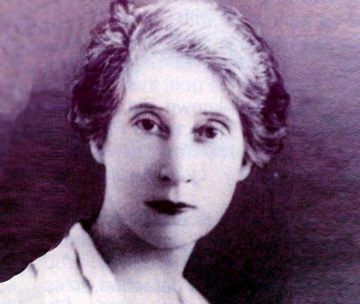 The life and career of the gifted Glaswegian writer Catherine Carswell was marked by such alarming and recurrent notoriety that her present obscurity is baffling. In 1908, still in her twenties and working as a newspaper critic, Carswell made headlines when a judge ruled that her husband, who suffered from murderous paranoid delusions, was of unsound mind at the time of their wedding. Although the couple had a daughter, Carswell got the marriage annulment she’d fought for and an enduring legal precedent was set. In 1930, she became a pariah in Scotland thanks to her sexually frank biography of national poet-hero Robert Burns, which offended zealous keepers of the Burns myth. One reader saw fit to send the author a letter containing a bullet, with the suggestion that she “leave the world a better, brighter, cleaner place.” Then, in 1932, Carswell’s biography of her friend D.H. Lawrence, The Savage Pilgrimage, was sensationally withdrawn from stores amid accusations of libel—not from the subject, who died in 1930, but from John Middleton Murry, the writer and critic. Murry, Lawrence’s posthumous biographer and the widower of Katherine Mansfield, had a tangled and volatile history with the late novelist and his wife, Frieda. An angry Lawrence once told Murry he was “an obscene bug sucking my life away.”
The life and career of the gifted Glaswegian writer Catherine Carswell was marked by such alarming and recurrent notoriety that her present obscurity is baffling. In 1908, still in her twenties and working as a newspaper critic, Carswell made headlines when a judge ruled that her husband, who suffered from murderous paranoid delusions, was of unsound mind at the time of their wedding. Although the couple had a daughter, Carswell got the marriage annulment she’d fought for and an enduring legal precedent was set. In 1930, she became a pariah in Scotland thanks to her sexually frank biography of national poet-hero Robert Burns, which offended zealous keepers of the Burns myth. One reader saw fit to send the author a letter containing a bullet, with the suggestion that she “leave the world a better, brighter, cleaner place.” Then, in 1932, Carswell’s biography of her friend D.H. Lawrence, The Savage Pilgrimage, was sensationally withdrawn from stores amid accusations of libel—not from the subject, who died in 1930, but from John Middleton Murry, the writer and critic. Murry, Lawrence’s posthumous biographer and the widower of Katherine Mansfield, had a tangled and volatile history with the late novelist and his wife, Frieda. An angry Lawrence once told Murry he was “an obscene bug sucking my life away.”
more here.
Literary Studies After Wittgenstein, Austin, and Cavell
Sarah Beckwith at nonsite:
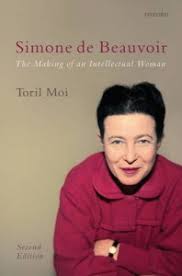 “To read a text isn’t to discover new facts about it,” says Moi, “it is to figure out what it has to say to us.”6 Understanding, meaning as use, responsiveness, responsibility, acknowledgement, the precision and inheritance of language: these are Toril Moi’s concerns in her refreshing, vitally important, generative book, a book that has the capacity to liberate us from language as a prison-house, and challenges and invites us into our own responsibility in words, as writers, readers, theorists, and critics. Moi wants us to wake up to the complexities of our inheritance of and use of language as if to invite us to exercise some stiffened and inflexible muscles to find greater, more various strengths and capacities. This is what makes this book such an exhilarating challenge and invitation at a time when literary studies seems to veer between the false allure of scientism (neurohumanities, “digital” humanities) and a fierce, entrenched moralism (which I take to be a stance which by-passes one’s own responses) and the professionalized credentializing, which sometimes appears to measure rather than judge academic work, all of which might break a graduate student’s spirit before she gets the chance to find her intellectual companions, and stand in the way of why she might ever have loved reading, thinking, and writing in the first place.
“To read a text isn’t to discover new facts about it,” says Moi, “it is to figure out what it has to say to us.”6 Understanding, meaning as use, responsiveness, responsibility, acknowledgement, the precision and inheritance of language: these are Toril Moi’s concerns in her refreshing, vitally important, generative book, a book that has the capacity to liberate us from language as a prison-house, and challenges and invites us into our own responsibility in words, as writers, readers, theorists, and critics. Moi wants us to wake up to the complexities of our inheritance of and use of language as if to invite us to exercise some stiffened and inflexible muscles to find greater, more various strengths and capacities. This is what makes this book such an exhilarating challenge and invitation at a time when literary studies seems to veer between the false allure of scientism (neurohumanities, “digital” humanities) and a fierce, entrenched moralism (which I take to be a stance which by-passes one’s own responses) and the professionalized credentializing, which sometimes appears to measure rather than judge academic work, all of which might break a graduate student’s spirit before she gets the chance to find her intellectual companions, and stand in the way of why she might ever have loved reading, thinking, and writing in the first place.
more here.
Pushkin and Russia
James Meek at the LRB:
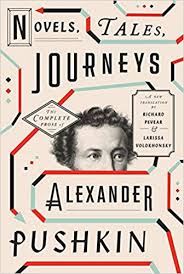 The truth, as strongly suggested in Eugene Onegin, is that Pushkin’s attitudes towards the country were as conflicted as the twin self the novel in verse projects. When he stayed at Mikhailovskoye after graduating from his elite Petersburg lycée he was both delighted and impatient. ‘I remember how happy I was with village life, Russian baths, strawberries and so on,’ he wrote. ‘But all this did not please me for long.’ In the country he was constantly riding out to find companionship, love and sex among his gentry neighbours – failing that, to have sex with one of the family serfs – but still had time enough for composition. In one three-month autumn stay in Boldino, where he was less desperate for company – just engaged, but without his future wife, Natalya Goncharova – he wrote thirty poems, all five Tales of Belkin and the satirical History of the Village of Goryukhino. He also wrote the ending of Eugene Onegin and four short plays, including Mozart and Salieri, the work by which he is – invisibly – best known to modern popular culture outside Russia, via the Peter Shaffer play it inspired, Amadeus, rendered onto the big screen by Miloš Forman.
The truth, as strongly suggested in Eugene Onegin, is that Pushkin’s attitudes towards the country were as conflicted as the twin self the novel in verse projects. When he stayed at Mikhailovskoye after graduating from his elite Petersburg lycée he was both delighted and impatient. ‘I remember how happy I was with village life, Russian baths, strawberries and so on,’ he wrote. ‘But all this did not please me for long.’ In the country he was constantly riding out to find companionship, love and sex among his gentry neighbours – failing that, to have sex with one of the family serfs – but still had time enough for composition. In one three-month autumn stay in Boldino, where he was less desperate for company – just engaged, but without his future wife, Natalya Goncharova – he wrote thirty poems, all five Tales of Belkin and the satirical History of the Village of Goryukhino. He also wrote the ending of Eugene Onegin and four short plays, including Mozart and Salieri, the work by which he is – invisibly – best known to modern popular culture outside Russia, via the Peter Shaffer play it inspired, Amadeus, rendered onto the big screen by Miloš Forman.
more here.
Tuesday Poem
The night poetry danced with us
Orlando 49
emblazoned on the back of a t-shirt
worn by a white queer
who looked through and past
our table of Latinx, Indigenous, Black, Muslim queers
right in front of her
as if we never existed
as if we were not sitting there
laughing and thriving
radiating life
insistent in our brown, black, mixed skinned existence
as if we were not the brilliance of the sun streaking fire
when it decides to go down on the horizon
as if you were not our queer siblings
familia yaars dildars
our amours our pyars
our everything
shaking beautiful bronzed hips
the night poetry danced with us
before being shot
the night poetry danced with us
before being assumed to be a shooter
the night poetry danced with us
before it became second nature
to check for exits
the night poetry danced with us
before bullets replaced stanzas
before the breath of our beloveds
became a line break
with too much finality
the night poetry danced with us
before we understood
some only value our lives
after we are gone
the night poetry danced with us
until we realized
we were the poem
by Amal Rana
from Split This Rock Poetry
Doublethink Is Stronger Than Orwell Imagined: What 1984 means today
George Packer in The Atlantic:
 No novel of the past century has had more influence than George Orwell’s 1984. The title, the adjectival form of the author’s last name, the vocabulary of the all-powerful Party that rules the superstate Oceania with the ideology of Ingsoc—doublethink, memory hole, unperson, thoughtcrime, Newspeak, Thought Police, Room 101, Big Brother—they’ve all entered the English language as instantly recognizable signs of a nightmare future. It’s almost impossible to talk about propaganda, surveillance, authoritarian politics, or perversions of truth without dropping a reference to 1984.Throughout the Cold War, the novel found avid underground readers behind the Iron Curtain who wondered, How did he know?
No novel of the past century has had more influence than George Orwell’s 1984. The title, the adjectival form of the author’s last name, the vocabulary of the all-powerful Party that rules the superstate Oceania with the ideology of Ingsoc—doublethink, memory hole, unperson, thoughtcrime, Newspeak, Thought Police, Room 101, Big Brother—they’ve all entered the English language as instantly recognizable signs of a nightmare future. It’s almost impossible to talk about propaganda, surveillance, authoritarian politics, or perversions of truth without dropping a reference to 1984.Throughout the Cold War, the novel found avid underground readers behind the Iron Curtain who wondered, How did he know?
It was also assigned reading for several generations of American high-school students. I first encountered 1984 in 10th-grade English class. Orwell’s novel was paired with Aldous Huxley’s Brave New World, whose hedonistic and pharmaceutical dystopia seemed more relevant to a California teenager in the 1970s than did the bleak sadism of Oceania. I was too young and historically ignorant to understand where 1984 came from and exactly what it was warning against. Neither the book nor its author stuck with me. In my 20s, I discovered Orwell’s essays and nonfiction books and reread them so many times that my copies started to disintegrate, but I didn’t go back to 1984. Since high school, I’d lived through another decade of the 20th century, including the calendar year of the title, and I assumed I already “knew” the book. It was too familiar to revisit.
More here.
People eat at least 50,000 plastic particles a year
Damian Carrington in The Guardian:
 The average person eats at least 50,000 particles of microplastic a year and breathes in a similar quantity, according to the first study to estimate human ingestion of plastic pollution. The true number is likely to be many times higher, as only a small number of foods and drinks have been analysed for plastic contamination. The scientists reported that drinking a lot of bottled water drastically increased the particles consumed. The health impacts of ingesting microplastic are unknown, but they could release toxic substances. Some pieces are small enough to penetrate human tissues, where they could trigger immune reactions.
The average person eats at least 50,000 particles of microplastic a year and breathes in a similar quantity, according to the first study to estimate human ingestion of plastic pollution. The true number is likely to be many times higher, as only a small number of foods and drinks have been analysed for plastic contamination. The scientists reported that drinking a lot of bottled water drastically increased the particles consumed. The health impacts of ingesting microplastic are unknown, but they could release toxic substances. Some pieces are small enough to penetrate human tissues, where they could trigger immune reactions.
Microplastic pollution is mostly created by the disintegration of plastic litter and appears to be ubiquitous across the planet. Researchers find microplastics everywhere they look; in the air, soil, rivers and the deepest oceans around the world. They have been detected in tap and bottled water, seafood and beer. They were also found in human stool samples for the first time in October, confirming that people ingest the particles. The new research, published in the journal Environmental Science and Technology, took the data from 26 previous studies that measure the amounts of microplastic particles in fish, shellfish, sugar, salt, beer and water, as well as in the air in cities. The scientists then used US government dietary guidelines to calculate how many particles people would eat in a year. Adults eat about 50,000 microplastic particles a year and children about 40,000, they estimated.
More here.
On Not Knowing: Irony and the English Department
by Emily Ogden

Because I wanted to write about something I believe in, my topic today is irony.
The alert reader is already asking, can you believe in irony? The ironist is widely supposed to be a person who doesn’t really believe in anything. Disavowing her attachments as soon as she forms them, holding nothing sacred, she occupies a stance of cool detachment. I don’t think this picture is right. Far from detaching us from the world, irony allows us at once to hold fast to our attachments and to hold them at a distance; to be convinced about our convictions and to be willing to question them.
Such a definition of irony doesn’t necessarily change the ironist’s outward aspect. Go ahead and imagine the same cool customer as before, if you like. But reconsider what might lie behind her performance of detachment. She doesn’t simply say the opposite of what she means for comic effect, as a sarcastic wit might do. Instead, the ironist means everything she says and more besides. If I say that irony is the one thing I really and truly believe in, for example, I’m deliberately invoking the conflict we think exists between irony and belief. I invoke that conflict not to cancel the belief with the irony, but to show that these attitudes can survive their mutual antagonism. Not all conflicts have to end in the extermination of one combatant. Read more »
Monday Poem
Cup

…—for Catherine Regec Mraz
this is how I most
remember her I’d have been
maybe eight, I open the door
to her house and hear
the latch click,
clock tick
we have tea at her table
I ask for grandpa’s cup
which she brings from her pantry shelf
and sets upon the table
pours hot water into its metal
beige-enameled steam-blessed bowl
with light-green rim
adds teabag a little sugar
I stir and sip as she in
Slovak-embellished English,
smiling, asks about my day and life
in the fragrant atmosphere
of chicken boiling in the soup
she made so well,
and calls me
Jeemy
………… I have that cup
—when the house was sold
after they’d gone we were gifted
with a last-chance tour
of rooms so simply lived in
and there’s my grandfather’s cup
on the shelf where he’d left it
near his wife’s tea and sugar
and
as was anciently told
I asked and it was given
Jim Culleny
6/7/19
Vulnerability, Violence, and the Political Uses of Frustration
by Joan Harvey

What made him a great poet was the unprotesting willingness with which he yielded to the ‘curse’ of vulnerability to ‘human unsuccess’ on all levels of human existence—vulnerability to the crookedness of the desires, to the infidelities of the heart, to the injustices of the world. —Hannah Arendt on Auden[i]
Sometimes we have to do the work even though we don’t yet see a glimmer on the horizon that it’s actually going to be possible. —Angela Davis
. . . something undaunted wants to move no matter how inauspicious the prospects, advance no matter how pained or ungainly. —Nathaniel Mackey
A man goes door to door, wearing his murdered son’s shoes, to ask voters to make him their state representative. His son, Alex, 27, had been gunned down in the Aurora theater shooting. The man, Tom Sullivan, is elected, even in a very conservative district, and shortly afterward sponsors an Extreme Risk Protection Bill to give law enforcement the ability to temporarily remove guns from people having a mental health crisis. He wears his murdered son’s leather jacket when he speaks on behalf of the bill. It’s too late for his son. But, he says, “I’m not doing this for Alex and my family, I’m doing it for yours. Watching your child’s body drop into the ground is as bad as it gets, and I’m going to do everything I can to make sure that none of you have to do that.” The bill passes. And then comes the campaign to recall Sullivan, organized by Rocky Mountain Gun Owners, a group who claims the NRA is a sellout, and whose executive director will get a cut of every dollar that the group raises. Republican Patrick Neville, Colorado House minority leader, is helping to organize these recalls.[ii] And this is only one of nine recalls proposed in Colorado.
In the film Knock Down the House, the three women profiled along with Alexandria Ocasio-Cortez all ran based on their experience with systemic violence. Amy Vilela of Nevada lost her daughter when a hospital refused to admit her because she didn’t have insurance. Paula Jean Swearengin of West Virginia lost many friends and family to cancer caused by coal mining. Cori Bush of St. Louis lived in close proximity to Ferguson. All these women ran tough campaigns against entrenched incumbents and all three lost their races. Read more »
Perceptions

Sughra Raza. Mid-day Still. Chitwan Forest, Nepal, 2017.
Digital photograph.
“Oh, the humanities!”
by Jeroen Bouterse
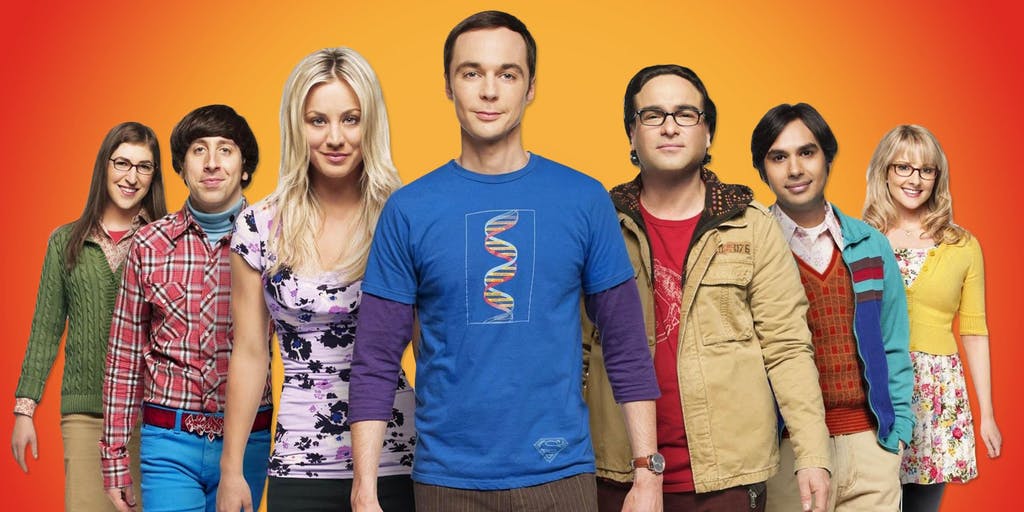 The Big Bang Theory has been one of the most successful sitcoms in TV history. Last month it ended. In many ways, it ended a long way from where it had begun; many commentators have noticed how the show has evolved together with cultural norms in the past decade. Its first seasons milked gender-stereotypes to an embarrassing extent; later, the main cast included more women, and generally changed its tone on gender and science – even making it a theme in several episodes.
The Big Bang Theory has been one of the most successful sitcoms in TV history. Last month it ended. In many ways, it ended a long way from where it had begun; many commentators have noticed how the show has evolved together with cultural norms in the past decade. Its first seasons milked gender-stereotypes to an embarrassing extent; later, the main cast included more women, and generally changed its tone on gender and science – even making it a theme in several episodes.
Still, a sitcom like BBT needs its stereotypes, and BBT’s idea of geek culture did remain stereotypical; if not on the level of gender, then in other ways that I want to explore here. Read more »
Catspeak
by Brooks Riley
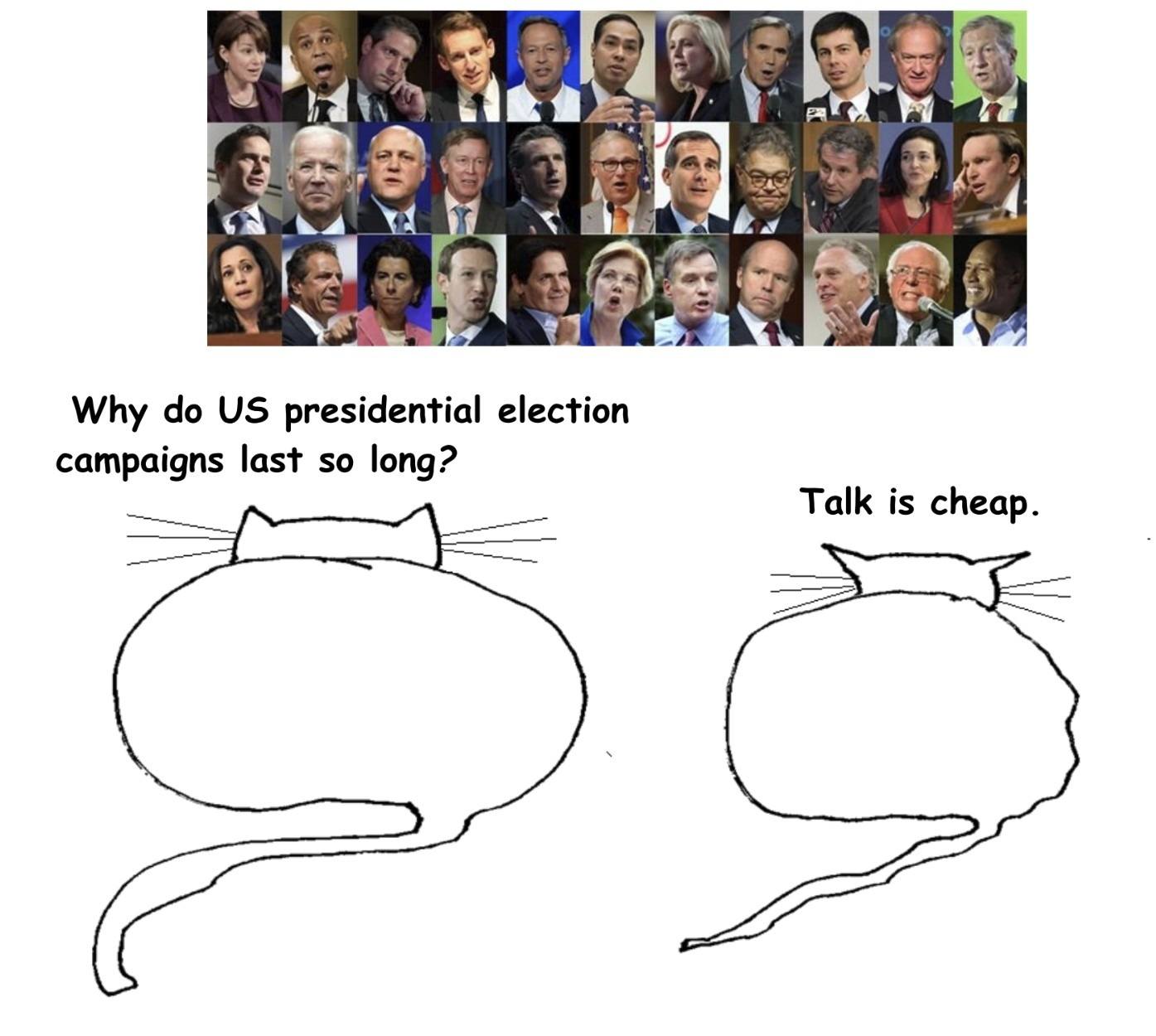
Infinite horizons
by Ashutosh Jogalekar
 The Doomsday Scenario, also known as the Copernican Principle, refers to a framework for thinking about the death of humanity. One can read all about it in a recent book by science writer William Poundstone. The principle was popularized mainly by the philosopher John Leslie and the physicist J. Richard Gott in the 1990s; since then variants of it have have been cropping up with increasing frequency, a frequency which seems to be roughly proportional to how much people worry about the world and its future.
The Doomsday Scenario, also known as the Copernican Principle, refers to a framework for thinking about the death of humanity. One can read all about it in a recent book by science writer William Poundstone. The principle was popularized mainly by the philosopher John Leslie and the physicist J. Richard Gott in the 1990s; since then variants of it have have been cropping up with increasing frequency, a frequency which seems to be roughly proportional to how much people worry about the world and its future.
The Copernican Principle simply states that the probability of us existing at a unique time in history is small because we are nothing special. We therefore must exist roughly close to half the period of our existence. Using Bayesian statistics and the known growth of population, Gott and others then calculated lower bounds for humanity’s future existence. Referring to the lower bound, their conclusion is that there is a 95% chance that humanity will go extinct in 9120 years.
The Doomsday Argument has sparked a lively debate on the fate of humanity and on different mechanisms by which the end will finally come. As far as I can tell, the argument is little more than inspired numerology and has little to do with any rigorous mathematics. But the psychological aspects of the argument are far more interesting than the mathematical ones; the arguments are interesting because they tell us that many people are thinking about the end of mankind, and that they are doing this because they are fundamentally pessimistic. This should be clear by how many people are now talking about how some combination of nuclear war, climate change and AI will doom us in the near future. I reject such grim prognostications because they are mostly compelled by psychological impressions rather than by any semblance of certainty. Read more »
Poetry in Translation
Two Poems by Muhammed Iqbal (1877-1938)
Bright Rose
You cannot loosen the heart’s knot,
perhaps you have no heart
no share in the turmoil
of this garden where I yearn
but gather no roses.
Of what use is wisdom to me?
Once out of the garden,
you are at peace. I am anxious,
scorched as I search.
Even Jamshed’s empty cup
foretold the future,
may wine never touch my lips,
open circle in a mirror.
Withered Rose
By what words can I deem you
desire of the nightingale’s heart?
The morning breeze was your cradle,
garden a tray of perfumes.
My tears rain like dew,
and in my barren heart your ruin
an emblem of mine.
My life a dream of roses.
Trans-created from the original Urdu by Rafiq Kathwari / @brownpundit.
We Have To Talk
by Thomas O’Dwyer
![Henri Matisse created many paintings titled 'The Conversation'. This, from 2012, is of the artist with his wife, Amélie. [Hermitage Museum, St. Petersburg, Russia].](https://3quarksdaily.com/wp-content/uploads/2019/06/Matisse_Conversation-360x292.jpg)
“Every visit to California convinces me that the digital revolution is over, by which I mean it is won. Everyone is connected. The New York Times has declared the death of conversation,” Simon Jenkins grumbled in The Guardian, seven years ago. Is it true, and if it is, who cares? That sounds like the start of an interesting discussion. Is daily conversation of any value and if it fades away, who’s to say the time saved can’t be better used? Robert Frost thought that “half the world is people who have something to say and can’t, and the other half who have nothing to say and keep on saying it.” Read more »
Monday Photo

Fruit in a bowl in the kitchen of a B&B in Basel, Switzerland, in January of 2017.
Clear And Simple Prose
by Mary Hrovat
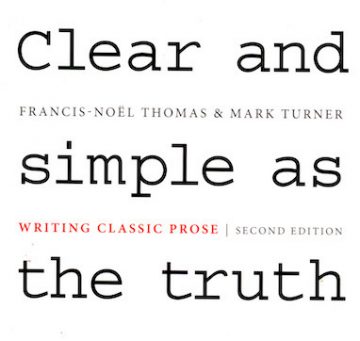 Books about how to write are so frequently described as life-changing and essential (usually by publishers, but sometimes by reviewers) that I was initially unmoved by enthusiastic reviews of Clear and Simple as the Truth: Writing Classic Prose, by Francis-Noël Thomas and Mark Turner. However, the praise seemed to focus on the fact that the book had changed the reviewers’ attitudes toward what writing is and how it works, and that interested me. I decided to get a copy, and I’m glad I did. The book describes and illustrates a particular style of writing but also, and perhaps more importantly, it really did give me a different framework for thinking about what style is and, yes, what writing is. Read more »
Books about how to write are so frequently described as life-changing and essential (usually by publishers, but sometimes by reviewers) that I was initially unmoved by enthusiastic reviews of Clear and Simple as the Truth: Writing Classic Prose, by Francis-Noël Thomas and Mark Turner. However, the praise seemed to focus on the fact that the book had changed the reviewers’ attitudes toward what writing is and how it works, and that interested me. I decided to get a copy, and I’m glad I did. The book describes and illustrates a particular style of writing but also, and perhaps more importantly, it really did give me a different framework for thinking about what style is and, yes, what writing is. Read more »
Mythology in English
by Gabrielle C. Durham
 Did completing your taxes seem a Herculean task? Did cleaning your adolescent bedroom compare to mucking the Augean stables? Are you more jovial or saturnine by nature? Do you or anyone you know suffer from narcissism? Did you see the movie Titanic? Have you ever been hypnotized? Do you want to go on an odyssey? These questions are all so tantalizing, no?
Did completing your taxes seem a Herculean task? Did cleaning your adolescent bedroom compare to mucking the Augean stables? Are you more jovial or saturnine by nature? Do you or anyone you know suffer from narcissism? Did you see the movie Titanic? Have you ever been hypnotized? Do you want to go on an odyssey? These questions are all so tantalizing, no?
These are not the non sequiturs they may initially seem. Each one refers to Greek or Roman mythology. From echoing valleys to arachnophobia, mythology is a vocabulary geyser for so much of the Western world. Mythology serves us so well for these are the timeless stories of our culture. Depending on how you ethically roll, mythology tends to be more convenient, more easily encapsulated than most forms of organized religion. There’s no grey area with the Greek and Roman gods: Zeus/Jupiter was a tramp, Ares/Mars was a hothead, and Aphrodite/Venus was trouble to any romantic union.
After reading and hearing some of the myths and how they reverberate through literature and entertainment, we grasp some universals of human behavior. The characters and their situations serve as shorthand. Don’t we all understand the admonition not to be arrogant like Icarus and fly too close to the sun with our waxen wings? For those of us who indulge, perhaps overmuch in some bacchanals, we know In vino veritas (In wine there is truth), courtesy of Dionysus/Bacchus. This saying conveys in many languages.
Here are some of the stories behind the terms used in the first paragraph. Read more »
Perception As Controlled Hallucination
Andy Clark at Edge:
 The big question that I keep asking myself at the moment is whether it’s possible that predictive processing, the vision of the predictive mind I’ve been working on lately, is as good as it seems to be. It keeps me awake a little bit at night wondering whether anything could touch so many bases as this story seems to. It looks to me as if it provides a way of moving towards a third generation of artificial intelligence. I’ll come back to that in a minute. It also looks to me as if it shows how the stuff that I’ve been interested in for so long, in terms of the extended mind and embodied cognition, can be both true and scientifically tractable, and how we can get something like a quantifiable grip on how neural processing weaves together with bodily processing weaves together with actions out there in the world. It also looks as if this might give us a grip on the nature of conscious experience. And if any theory were able to do all of those things, it would certainly be worth taking seriously. I lie awake wondering whether any theory could be so good as to be doing all these things at once, but that’s what we’ll be talking about.
The big question that I keep asking myself at the moment is whether it’s possible that predictive processing, the vision of the predictive mind I’ve been working on lately, is as good as it seems to be. It keeps me awake a little bit at night wondering whether anything could touch so many bases as this story seems to. It looks to me as if it provides a way of moving towards a third generation of artificial intelligence. I’ll come back to that in a minute. It also looks to me as if it shows how the stuff that I’ve been interested in for so long, in terms of the extended mind and embodied cognition, can be both true and scientifically tractable, and how we can get something like a quantifiable grip on how neural processing weaves together with bodily processing weaves together with actions out there in the world. It also looks as if this might give us a grip on the nature of conscious experience. And if any theory were able to do all of those things, it would certainly be worth taking seriously. I lie awake wondering whether any theory could be so good as to be doing all these things at once, but that’s what we’ll be talking about.
A place to start that was fun to read and watch was the debate between Dan Dennett and Dave Chalmers about “Possible Minds” (“Is Superintelligence Impossible?“ Edge, 4.10.19). That debate was structured around questions about superintelligence, the future of artificial intelligence, whether or not some of our devices or machines are going to outrun human intelligence and perhaps in either good or bad ways become alien intelligences that cohabit the earth with us. That debate hit on all kinds of important aspects of that space, but it seemed to leave out what looks to be the thing that predictive processing is most able to shed light on, which is the role of action in all of these unfoldings.
More here.
